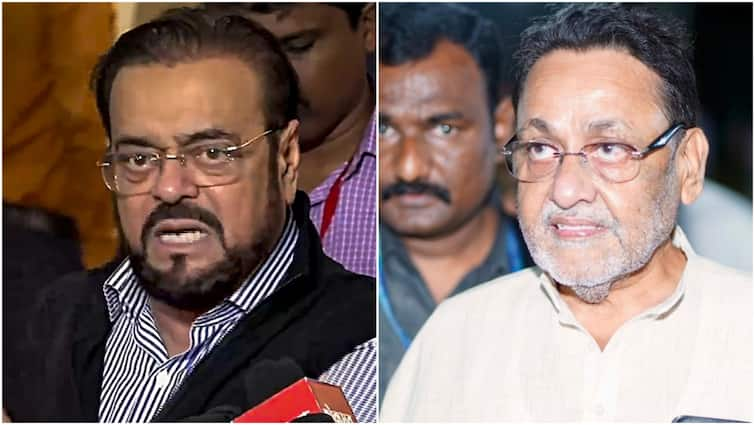 |
|
The Maharashtra Assembly elections witnessed a significant victory for Abu Azmi of the Samajwadi Party (SP) in the Mankhurd Shivaji Nagar constituency. Azmi, the incumbent MLA, secured a decisive win against his formidable opponent, Nawab Malik of the Nationalist Congress Party (NCP), defeating him by a substantial margin of over 5,000 votes by afternoon. This victory marks Azmi's continued dominance in the constituency, having held the seat since its inception in 2009. The election was highly anticipated, drawing considerable attention due to the high-profile candidates and the complex political dynamics at play within the state.
The contest between Azmi and Malik was fraught with political intrigue and controversy. Malik's candidacy itself was mired in debate, stemming from his alleged links to the underworld don, Dawood Ibrahim. This connection raised concerns within the BJP, a key member of the Mahayuti alliance, leading to significant disagreements about his inclusion on the alliance's ticket. Despite these objections, Ajit Pawar, a key figure within the NCP, insisted on fielding Malik, a move that ultimately proved unsuccessful. The decision to place Malik in Mankhurd Shivaji Nagar, shifting him from his previous Anushakti Nagar seat, was a calculated gamble by Pawar that ultimately backfired, showcasing the political risks inherent in such strategic moves.
The high-stakes nature of this election extended beyond the individual candidates. For the SP, Azmi's victory represents a critical win, preserving their presence in the Maharashtra assembly. A loss would have been a significant blow to the party's standing within the state. Meanwhile, the NCP faced potential damage to its reputation and influence. The election unfolded against the backdrop of considerable political turmoil within Maharashtra. The state has recently witnessed significant upheavals following internal party rebellions within both the Shiv Sena and the NCP, leading to power shifts and fractured alliances. The 2023 election was pivotal, with the BJP-led Mahayuti trying to maintain its hold on power and the opposition coalition, Maha Vikas Aghadi (MVA), aiming to gain ground following recent successes in the 2024 Lok Sabha elections.
The election itself was held on November 20th, 2023, witnessing a voter turnout of 52.14% in Mankhurd Shivaji Nagar, against a state-wide turnout of 66.05% – the highest in 30 years. The intense campaigning from both Mahayuti and Mahavikas Aghadi underscores the significance of this election in the context of the broader political landscape of Maharashtra. The division within the NCP, culminating in the split between Sharad Pawar and Ajit Pawar, further complicated the political scenario. The rebellion orchestrated by Ajit Pawar had a direct impact on the allocation of seats and the candidates fielded, adding another layer of complexity to this already tense election. The repercussions of these internal party conflicts extended beyond the individual constituencies, impacting the overall political strength and positioning of the major parties in the state.
The results from Mankhurd Shivaji Nagar highlight the unpredictability of electoral politics and the significant role that individual candidates and their perceived strengths and weaknesses play in determining outcomes. While party affiliations and alliances certainly play a substantial part, this election demonstrates how local factors, candidate controversies, and internal party disputes can substantially affect the electoral landscape. The high voter turnout, despite the political turmoil, showcases the engagement of the electorate in the democratic process and the importance of these elections to shaping the future of Maharashtra. The outcome in Mankhurd Shivaji Nagar is not simply a local victory but reflects broader trends and power dynamics within Maharashtra’s complex political arena.
